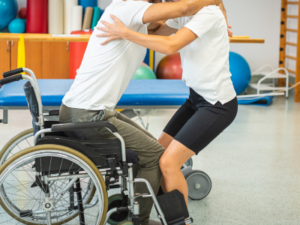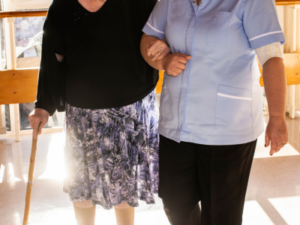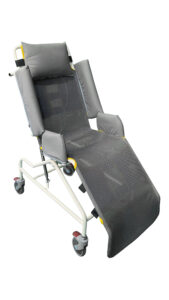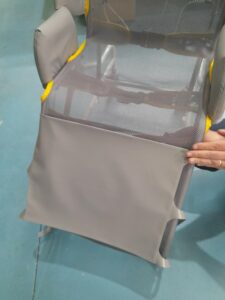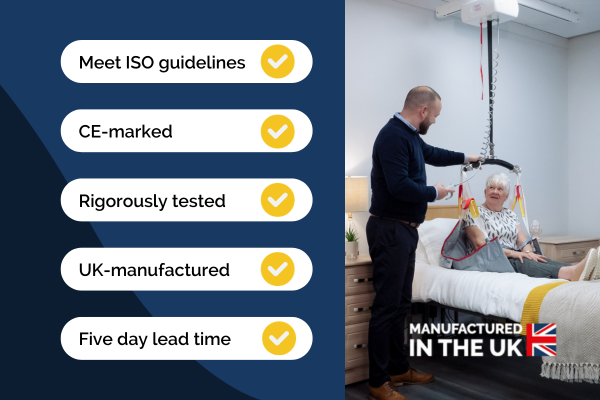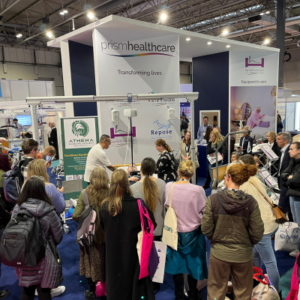Safe patient transfers
Ceiling track hoists provide a safe and comfortable method for transferring patients. A person can be positioned more easily using the ceiling track hoist, as they can be raised, lowered, turned, and traversed with no physical effort from the caregiver. This reduces the risk of injury to both patients and caregivers. A secure and stable hoist system will move clients smoothly and efficiently, minimising physical strain on the caregiver.
Increased efficiency
Ceiling track hoists are always accessible where you need them. This means caregivers are more likely to use them instead of a mobile hoist, which may not be immediately accessible. This results in faster and more efficient patient transfers, minimising the time and effort necessary for each transfer. Such efficiency can enhance productivity and reduce patient waiting times.
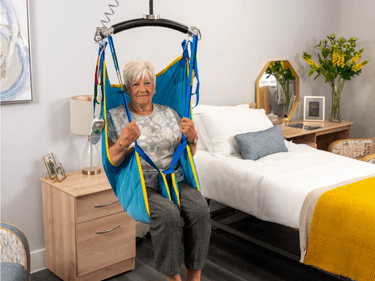
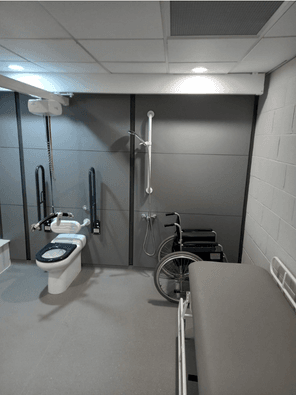
Ceiling track hoist versatility
A ceiling track hoist is ideal for various care environments, from hospitals and care homes to private residences. With numerous hoist systems and accessories available, we can install tailored solutions to meet the specific needs of any care setting. Furthermore, you can use the same hoist can for transfers between the floor and chair, chair and shower stretcher, raised bath, or bed.
Space-saving
Ceiling track hoists occupy minimal floor space, making them ideal for restricted areas such as toilets or small bathrooms where a mobile hoist might be challenging to manoeuvre. This can help improve accessibility and make it easier to provide high-quality care in challenging environments.
Improved client experience
A ceiling track hoist can lift higher than a mobile hoist and can, in most cases, be operated by a single person. It operates via a handset, leaving the caregiver free to assist the client at all times. This enables closer contact between the user and the caregiver, offering a more personalised and dignified experience than other solutions.
Clients report feeling more secure because they do not experience any sudden movements. The Freeway Transactive Xtra and Freeway TX Advanced models have ‘soft start’ as a standard feature, meaning that the hoist gradually builds up to its full speed and virtually eliminates jerking.
Cost-effective
While ceiling track hoists may require an initial investment, they can be a cost-effective long-term solution for patient transfer. By reducing the risk of injury and increasing efficiency, they can help to improve patient outcomes and reduce the need for additional staffing or equipment. Ceiling track hoists are covered by a Disabled Facilities Grant (DFG), and Prism Medical UK is a government-approved provider of DFG-approved fixed equipment solutions. Find out if you could be eligible for a DFG grant.
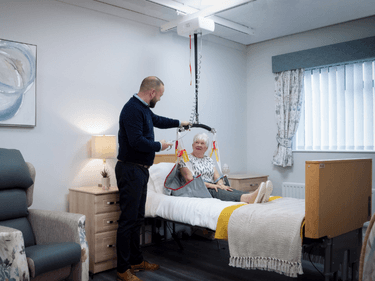
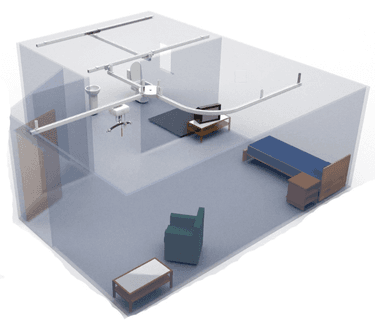
Ceiling Track Hoist Installation flexibility
Prism Medical UK also installs and maintains ceiling track hoists. Our engineers can install a simple straight-track or H-system in just a few hours. A more complex system can cover whole floors of buildings and allow transfer at any point. Our Major Projects team can support the delivery of large-scale or complex builds. They have also been involved in several Changing Places developments.
Improved quality of life
Installing a hoist can often allow a person to stay in or return to their home when hospitalisation or long-term care would otherwise be necessary. In some cases, the hoist offers an opportunity for greater independence. Both factors contribute to improved quality of life and well-being.
You may like to read “Ceiling Track Hoist Installation Case Story: Adapting for Accessibility and Family Care for Multiple Sclerosis (MS)“.
Ceiling track hoist installation tailored to your needs
With a wide range of installation components, we can create a customised system to suit your home or care facility. Our free consultation thoroughly assesses the client’s mobility requirements, the caregiver’s needs, and the environment. This ensures we recommend and install the ideal solution. Arrange your free assessment today.



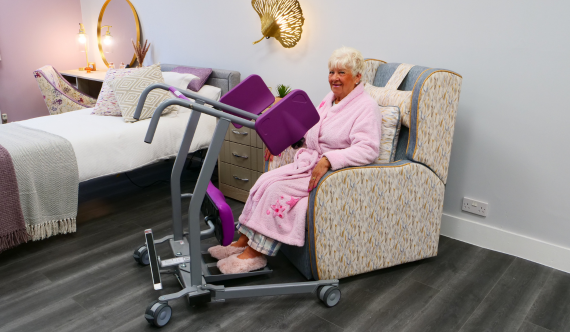
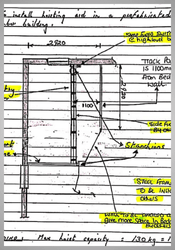
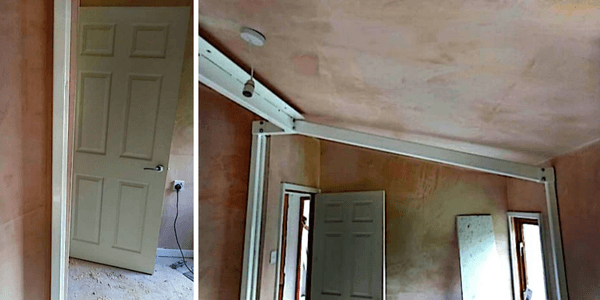
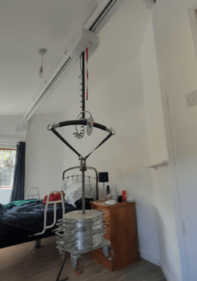
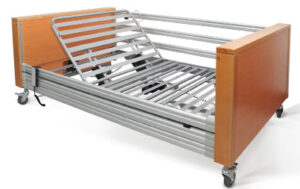
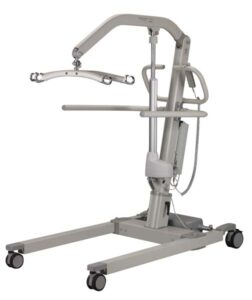
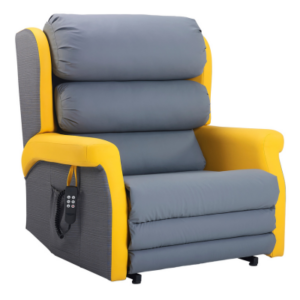
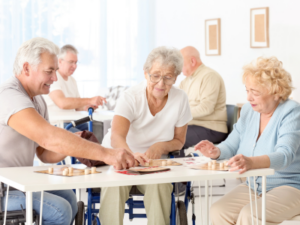 As society ages, the demand for day-to-day living support continues to rise. However, social care faces challenges amidst this growing need, particularly with funding cuts that have led to staff shortages and reduced training opportunities. In navigating these troubled waters, ensuring the safety and well-being of carers and those they support becomes paramount. If you have concerns regarding the safe handling of a loved one, we encourage you to contact your local social services department and request an Occupational Therapy review of the moving and handling risk assessment and plan.
As society ages, the demand for day-to-day living support continues to rise. However, social care faces challenges amidst this growing need, particularly with funding cuts that have led to staff shortages and reduced training opportunities. In navigating these troubled waters, ensuring the safety and well-being of carers and those they support becomes paramount. If you have concerns regarding the safe handling of a loved one, we encourage you to contact your local social services department and request an Occupational Therapy review of the moving and handling risk assessment and plan. In healthcare environments, moving and lifting individuals is a common task that demands precision and care. Any ‘caregiver’ that needs to move or lift a person is at a high risk of lumbar complaints or disorders.1 When performed correctly, it enhances independence and quality of life while minimising the risk of injury.2 A 2013 study testing different patient transfer types showed that the lumbar load was considerably reduced when using optimised techniques or assistance aids.3 However, inadequate training and improper techniques can result in accidents and discomfort for carers and clients.
In healthcare environments, moving and lifting individuals is a common task that demands precision and care. Any ‘caregiver’ that needs to move or lift a person is at a high risk of lumbar complaints or disorders.1 When performed correctly, it enhances independence and quality of life while minimising the risk of injury.2 A 2013 study testing different patient transfer types showed that the lumbar load was considerably reduced when using optimised techniques or assistance aids.3 However, inadequate training and improper techniques can result in accidents and discomfort for carers and clients.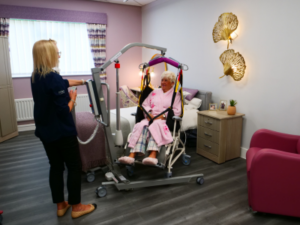
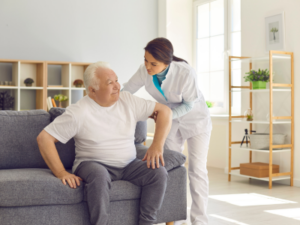 Also known as the underarm lift, this is when the client is lifted or supported under the armpit. It is typically used to lift someone up the bed, support them from sitting to standing or help them from the floor. It is done by hooking the elbow around the client’s arm, just under the armpit, and dragging them to the desired position.
Also known as the underarm lift, this is when the client is lifted or supported under the armpit. It is typically used to lift someone up the bed, support them from sitting to standing or help them from the floor. It is done by hooking the elbow around the client’s arm, just under the armpit, and dragging them to the desired position.